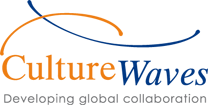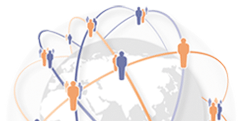
In the beginning, there is a group of people who are supposed to work together. The different group members hardly know each other and there is neither a common identity, nor a common vision, or shared objectives. In many cases, there also is no common location of all the group members.
It is in these situations that team development becomes an issue.
In today’s business world, there is a large number of international teams. Team members are spread among different countries and continents, and cooperation mainly happens virtually.
Traditional team development programs usually fail to address the international and virtual aspects of the situation. Therefore, the potential of multicultural teams and multicultural cooperation can often not be exploited in an optimal way. Different mindsets and different work or communication styles of the international team members lead to conflicts and misunderstandings rather than being an asset to team work.
At this point, facilitation steps in with both intercultural team development competence, as well as international work experience.
We are looking forward to advising you regarding customised team development measures.
You can reach us via phone +49 (0)2227 908 6252 and email contact@culturewaves.com. Or just use our contact form.
Developing potential and increasing team productivity
Team development helps teams to reach long-lasting high performance levels. For this, team development is not a one-time activity, but rather a process.
According to a model introduced by Bruce Tuckmann, every team goes through four different phases. His model is often introduced in team development processes to find out about the current stage of a team. Based on the findings, the most suitable approach to boost a team’s performance can be defined.
In the first phase (forming), it is advisable to organize a kick-off workshop, in which team members get to know each other. This workshop aims at creating a common base for understanding. If it is an international team, an understanding of the members’ different backgrounds, work and communication styles can be developed during this workshop.
Once the team reaches the second phase (storming), it is important to create a safe workshop environment. Team members then can give feedback to each other, reflect on mutual expectations, and work on process optimisation.
During the third phase (norming), the team can develop and determine rules and regulations for the entire group. With these rules being put into practice, the team will be able to perform better and reach better results (performing).
An external facilitator can advise a team on how to regularly reflect the status quo, goals, changes and interaction among team members. In doing so, the systemic position of the group in an organisation and the organisation’s context is important. During team development measures, the external facilitator gives impulses and moderates. The team’s own abilities are used to develop suitable approaches and solutions.
In order to avoid communication difficulties or misunderstandings in international teams, the team can focus on non-verbal communication and visualisation methods, rephrase findings to find common ground and reach common understanding. By developing processes and rules for future cooperation, a stronger bond and commitment of single team members are promoted.
Preferred problem solving measures vary depending on culture, which is crucial for multicultural teamwork. Aspects, such as face-saving and indirect communication styles can be addressed when it comes to problems in multicultural groups.
In order to benefit from cultural differences in cooperation, a systematic and culturally sensitive team development process is necessary. In this way, the learning potential of intercultural interaction can be exploited and becomes beneficial for individual team members, as well as for the whole team. External support for workshops, training or coaching has proven useful.
Team development for remote teams
The collaboration of virtual teams with members in different locations follows its own laws. It is a special challenge for managers because the communication, leadership and moderation competences needed differ from those needed when working with teams located in one location. More information regarding this topic can be found under virtual leadership.
When it comes to virtual cooperation, not only managers, but also employees should be well prepared: Workshops on how to use virtual communication platforms, intercultural trainings with a focus on the many aspects of virtual communication, or seminars to improve virtual communication skills are viable measures.
Do you have any special requests?
Depending on needs and target group, we incorporate topics addressed by the team and adapt our team development concept to the current situation and to the specific challenges of your organisation.
Embracing diversity: the CultureWaves team
The CultureWaves team consists of more than 120 qualified consultants with international training, facilitation and leadership experience in different fields and positions.
Methodological approach
CultureWaves uses a variety of methods. With decades of experience in designing and delivering customized development programmes, CultureWaves has optimized training and facilitation methods for your maximum benefit.
Good preparation is crucial. For us, this includes the following steps: clarifying the context with HR and customer, defining objectives, as well as a needs analysis with team members or other stakeholders. Based on this, we create a team development process with its customised exercises and content. Moreover, we take care of choosing a suitable venue, of logistics and coordination.
Post-work includes a detailed documentation of results, post-measure discussion with management and HR, as well as reflection on the process and suggestions for a sustaining team success. The transfer of the team development results into the organisation can also be made subject of discussion.
You might also be interested in
- Leadership coaching
- Consulting
- Project coaching
- Conflict resolution
- Diversity management
- Intercultural training
- Managing multicultural teams
… and many other services.
At your service! With competence and experience. We are looking forward to being in touch with you!
Since 1999, CultureWaves delivers customised team development programmes for satisfied customers all over the world.
Benefit from the quality of our work!
You can reach us via phone +49 (0)2227 908 6252 and email contact@culturewaves.com. Or just use our contact form. Thanks for contacting us!


